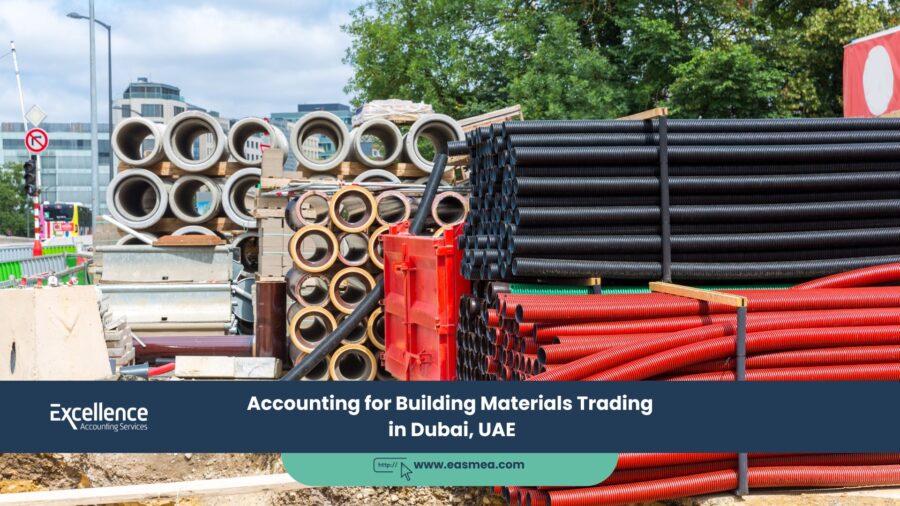In the heart of Dubai’s relentless construction and development, building materials trading companies are the indispensable suppliers that form the skeleton of the city’s growth. From structural steel and cement to high-end finishing materials, these traders are the critical link in the construction supply chain. While the market is vast and full of opportunity, it is also a highly competitive, credit-driven industry where profitability depends on meticulous financial management and operational efficiency.
Accounting for a building materials trading company in Dubai is a complex discipline that must contend with bulk inventory management, project-based supply cycles, and, most critically, the high-risk nature of credit sales to the construction sector. Without a robust accounting framework to manage these challenges, even a company with high turnover can see its profits crumble under the weight of bad debts, poor inventory control, and hidden logistical costs.
This definitive guide provides a strategic blueprint for Accounting for Building Materials Trading in Dubai, UAE. We will explore the essential financial practices for the sector, from the nuances of calculating landed costs and managing inventory to the critical importance of credit control. We will also provide clarity on the application of VAT and the new UAE Corporate Tax to your operations, ensuring your business is built on a foundation of compliance and financial strength.
Whether you trade in bulk commodities or specialized finishing products, this guide will equip you with the financial knowledge to build a resilient and profitable enterprise. We will cover industry best practices, essential financial controls, and the reporting that builds confidence with suppliers, contractors, and financial institutions.
Key Takeaways
- Credit Management is Your Biggest Risk: The core challenge is managing long credit periods extended to contractors. A robust credit control and collections process is essential to prevent bad debts and manage cash flow.
- Accurate Inventory Control is Crucial: Effectively managing a diverse inventory of bulk materials, high-value items, and special orders is key to controlling costs and protecting your assets.
- Calculate the “Landed Cost” for Imports: The true cost of your materials must include the purchase price plus all import costs like shipping, customs duties, and transport to your warehouse.
- Project-Based Supply Costing: You must be able to track the profitability of supplies to major projects or key customers to ensure your pricing and terms are profitable.
- VAT and Corporate Tax Compliance: Building materials are subject to 5% VAT, and your profits are subject to 9% Corporate Tax. Compliant accounting is a legal and financial necessity.
The Financial Framework of Building Materials Trading
A building materials trading company is a vital B2B distributor in the construction ecosystem. The business model is driven by relationships with both suppliers (manufacturers) and customers (contractors and developers). Success depends on reliable sourcing, competitive pricing, efficient logistics, and, most importantly, the ability to manage the financial risks associated with the construction industry’s payment cycles.
Operating in Dubai means that many products must meet specific standards and certifications set by the Dubai Municipality, such as those for fire safety and material quality. The costs associated with testing and certification are a necessary part of your business operations and must be accounted for correctly.
The Core of Accounting for Building Materials Trading in Dubai, UAE
The fundamental principle of accounting for building materials trading in Dubai, UAE, is the rigorous management of your two largest assets: your inventory and your accounts receivable (the money owed to you by customers). These two areas represent the bulk of your working capital and hold the greatest financial risk. A professional bookkeeping service is essential to manage these critical areas with the required precision.
Credit Sales Management: Your Biggest Financial Risk
The construction industry is notorious for its long and often unpredictable payment cycles. It is standard practice to provide credit terms of 60, 90, or even 120 days to contractors. While necessary to win business, this exposes your company to significant credit risk and can put immense strain on your cash flow. Your accounts receivable ledger is not just a list of sales; it’s a measure of your company’s risk exposure.
In building materials trading, a sale is not a success until the cash is in the bank. Your credit control team is your most important profit protection unit.
A robust credit management process is non-negotiable. This must include:
- Strict Credit Checks: Performing due diligence on new customers before offering them a credit line.
- Clear Credit Limits: Setting and enforcing a maximum credit limit for each customer.
- Systematic Collections: A disciplined process for following up on overdue invoices, starting from the day they become due.
- Provision for Doubtful Debts: Regularly reviewing your aged receivables and making an accounting provision for any invoices that are at high risk of not being collected. This ensures your profits are not artificially overstated.
A Closer Look at Accounting for Building Materials Trading in Dubai, UAE
Profitability in this competitive sector is determined by your ability to control costs at every stage of the supply chain. This requires a detailed approach to inventory management and costing, ensuring that every sale is priced to deliver a healthy margin.
Inventory Control: From Bulk Goods to Special Orders
Your inventory can be diverse, ranging from high-volume, low-margin bulk items like cement and sand to high-value finishing materials like sanitary ware or custom-ordered steel. Your inventory management system must be able to handle this diversity. It needs to track quantities and values accurately, manage stock locations (e.g., multiple warehouses), and provide data for optimizing stock levels. For bulk items, regular physical stock counts are necessary to verify the system’s accuracy.
Special-order items that you buy specifically for a client’s project require careful accounting. The cost of these items should be assigned directly to that client’s project or sales order. It’s also crucial to get a purchase order and often a deposit from the client before you place a non-cancellable order with your supplier, mitigating your risk if the client’s project is delayed or cancelled.
| Inventory Type | Key Challenge | Accounting Focus |
|---|---|---|
| Bulk Materials (e.g., Cement) | High volume, low margin, storage. | Accurate quantity tracking, managing logistics costs. |
| High-Value Items (e.g., Fittings) | High cost, risk of damage or theft. | Secure storage, item-level tracking, accurate costing. |
| Special Orders | Non-stockable, client-specific. | Matching purchase order to sales order, managing deposits. |
Calculating the “Landed Cost” of Imported Materials
The true cost of your inventory, especially imported materials, is not just the price on the supplier’s invoice. It is the full “landed cost,” which includes all expenses incurred to get the goods into your warehouse. A failure to accurately calculate this will lead to an incorrect Cost of Goods Sold (COGS) and a false sense of profitability. The landed cost must include the purchase price plus an allocated share of all import costs, such as freight, insurance, customs duties, and local transport. Your accounting system must be able to track these costs and apply them to the correct inventory items.
Navigating Tax and Customs in Dubai
As a trading company heavily involved in import and export, you must be an expert in navigating Dubai’s customs and tax regulations. Compliance is essential for the smooth flow of goods and for the financial health of your business. For the most authoritative guidance, you should always refer to the official websites of the Federal Tax Authority (FTA) and Dubai Customs.
VAT on Building Materials
The sale of building materials within the UAE is subject to the standard 5% rate of VAT. You must issue tax-compliant invoices and collect this tax from your customers. When you import materials, you will also pay 5% VAT at the time of customs clearance, which you can then reclaim as input VAT on your tax return. If you export materials to a client outside the UAE, this is a zero-rated supply, but you must retain all official export documentation as proof. A meticulous system for VAT accounting is crucial for managing these different scenarios.
Corporate Tax for Trading Companies
Your trading company will be subject to the 9% UAE Corporate Tax on its annual taxable profits exceeding AED 375,000. Your taxable profit is your gross profit (Sales minus COGS) less your operating expenses. The accuracy of your inventory valuation and landed cost calculations directly impacts your COGS and, therefore, your tax liability. Maintaining complete records for every transaction is mandatory. Professional corporate tax services are vital for ensuring compliance.
What Excellence Accounting Services Can Offer
At Excellence Accounting Services (EAS), we have extensive experience in the trading and construction supply chain sectors. We understand the financial pressures you face, from credit risk to inventory management. We offer specialized accounting services designed to provide the financial control and insight you need to succeed.
Our specialized offerings for building materials traders include:
- Inventory Accounting and Control Systems: We help you implement robust systems for tracking inventory, calculating landed costs, and managing stock levels effectively.
- Credit Control and Accounts Receivable Management: We can help you establish strong credit control policies and provide the reporting you need to manage your receivables and minimize bad debts.
- Project-Based Costing and Margin Analysis: We structure your accounts to allow for detailed analysis of profitability by customer, project, or product line.
- VAT, Customs, and Corporate Tax Compliance: Our tax experts specialize in the trading sector, managing all your compliance needs.
- Virtual CFO Services: Get high-level strategic guidance on cash flow management, trade finance, and profitability improvement. For more details, see our Virtual CFO services.
By partnering with EAS, you gain a financial team that understands the foundations of your industry. We handle the financial complexity so you can focus on building your business.
Frequently Asked Questions (FAQs)
This is the biggest risk in the industry. Your first line of defense is a strong credit policy: perform due diligence on new clients, set strict credit limits, and get personal guarantees or other forms of security where possible. Your second is a disciplined collections process. Your third is legal: your sales contracts and delivery notes should be robust. From an accounting perspective, you must regularly review your aged receivables and make a “provision for doubtful debts” for any amounts that are at high risk. This ensures your financial statements are realistic.
This is a “Sales Return.” You would issue a credit note to the contractor, which reduces their outstanding balance and your revenue. When you receive the materials back, you must inspect them. If they are in good, resalable condition, you add them back into your inventory at their original cost. If they are damaged and cannot be resold, you must “write them off” as an expense.
For most building materials, both methods are acceptable under IFRS. FIFO (First-In, First-Out) is often preferred as it is logical—you typically want to sell your oldest stock first. It can also result in a more accurate valuation of your closing stock on the balance sheet, as it’s valued at the most recent purchase prices. Weighted Average Cost is simpler to administer as it smooths out price fluctuations. The most important thing is to choose one method and apply it consistently from year to year.
Yes. If you charge a customer a delivery fee as part of the sale of goods, that fee is considered part of the overall taxable supply. Therefore, you must charge 5% VAT on the delivery charge, just as you do on the materials themselves.
An LC is a payment guarantee from your bank. When the LC is issued, it creates a contingent liability. The primary accounting entries happen when the goods are shipped and you receive the documents. At this point, you would record the inventory and a liability to your bank. The fees charged by the bank for the LC service are a deductible business expense. LCs are a common tool in international trade to provide security for both you and your supplier.
COGS represents the direct, landed cost of the materials that you have sold during a period. Operating Expenses (or overheads) are all the other costs of running the business, such as salaries of your sales and admin staff, warehouse rent, office utilities, and marketing. Separating these on your income statement is crucial. It allows you to calculate your Gross Profit (Revenue – COGS), which shows the core profitability of your trading activity before your fixed overheads are considered.
Yes. A forklift is a piece of equipment purchased for business use. You can reclaim the 5% input VAT you paid on its purchase in your VAT return. The forklift itself would be recorded as a fixed asset on your balance sheet and depreciated over its useful life. The annual depreciation is a deductible expense for Corporate Tax purposes.
This is a classic working capital problem, very common in this industry. The reason is that your cash is tied up in two main places: Inventory (materials sitting in your warehouse) and Accounts Receivable (money owed to you by contractors). You often have to pay your own suppliers in 30 days, but your customers might take 90 or 120 days to pay you. This “cash conversion cycle” can be very long. The solution is aggressive management of both inventory levels (to free up cash) and accounts receivable (to collect cash faster).
Your accounting data is a powerful negotiation tool. When you can show a major supplier your purchase history over the last several years—demonstrating the volume and value of business you give them—you are in a much stronger position to negotiate better prices, volume rebates, or more favorable credit terms. Data gives you leverage.
An independent audit is crucial for credibility, especially in the B2B world. Banks will almost certainly require audited financial statements before providing you with trade finance facilities or loans. Large corporate customers or major construction projects may also ask for them as part of their vendor due diligence process. An audit provides independent assurance that your financial statements are accurate and that you are a well-managed and financially stable company, which can be a significant competitive advantage.
Conclusion: Building a Profitable Trading Enterprise
In the heart of Dubai’s construction industry, a building materials trading company is a business of volume, logistics, and, above all, risk management. The success of your enterprise is not built on concrete and steel, but on the solid foundation of disciplined financial management. A robust accounting system that provides a true and accurate picture of your costs, margins, and credit exposure is your most critical tool.
By mastering the art of credit control, maintaining a firm grip on your inventory, and navigating the complexities of the UAE’s tax and customs landscape, you build a business that is not just active, but truly profitable. This financial clarity empowers you to make smarter purchasing decisions, price your supplies with confidence, and build a reputation for reliability that is the cornerstone of success in the construction supply chain.
From Foundation to Financials.
Let Excellence Accounting Services provide the specialized financial management and industry insight your building materials company needs to succeed in the UAE.




